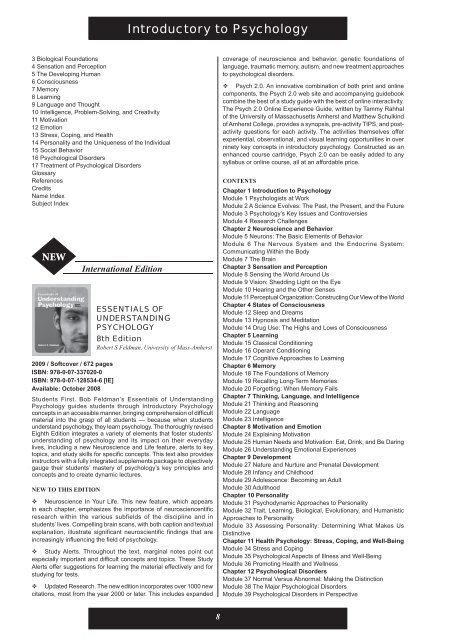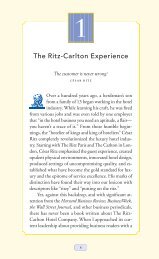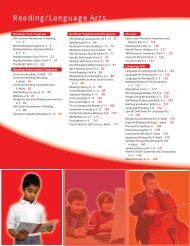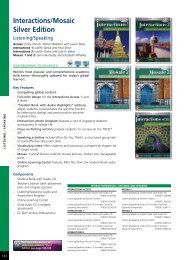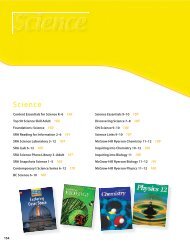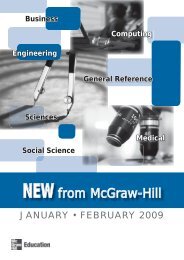PSYCHOLOGY & SOCIOLOGY - McGraw-Hill Books
PSYCHOLOGY & SOCIOLOGY - McGraw-Hill Books
PSYCHOLOGY & SOCIOLOGY - McGraw-Hill Books
- No tags were found...
You also want an ePaper? Increase the reach of your titles
YUMPU automatically turns print PDFs into web optimized ePapers that Google loves.
Introductory to Psychology3 Biological Foundations4 Sensation and Perception5 The Developing Human6 Consciousness7 Memory8 Learning9 Language and Thought10 Intelligence, Problem-Solving, and Creativity11 Motivation12 Emotion13 Stress, Coping, and Health14 Personality and the Uniqueness of the Individual15 Social Behavior16 Psychological Disorders17 Treatment of Psychological DisordersGlossaryReferencesCreditsName IndexSubject IndexNEWInternational EditionESSENTIALS OFUNDERSTANDING<strong>PSYCHOLOGY</strong>8th EditionRobert S Feldman, University of Mass-Amherst2009 / Softcover / 672 pagesISBN: 978-0-07-337020-0ISBN: 978-0-07-128534-6 [IE]Available: October 2008Students First. Bob Feldman’s Essentials of UnderstandingPsychology guides students through Introductory Psychologyconcepts in an accessible manner, bringing comprehension of difcultmaterial into the grasp of all students — because when studentsunderstand psychology, they learn psychology. The thoroughly revisedEighth Edition integrates a variety of elements that foster students’understanding of psychology and its impact on their everydaylives, including a new Neuroscience and Life feature, alerts to keytopics, and study skills for speci c concepts. This text also providesinstructors with a fully integrated supplements package to objectivelygauge their students’ mastery of psychology’s key principles andconcepts and to create dynamic lectures.NEW TO THIS EDITION Neuroscience In Your Life. This new feature, which appearsin each chapter, emphasizes the importance of neurosciencentificresearch within the various subfields of the discipline and instudents’ lives. Compelling brain scans, with both caption and textualexplanation, illustrate significant neuroscientific findings that areincreasingly influencing the field of psychology. Study Alerts. Throughout the text, marginal notes point outespecially important and difficult concepts and topics. These StudyAlerts offer suggestions for learning the material effectively and forstudying for tests. Updated Research. The new edition incorporates over 1000 newcitations, most from the year 2000 or later. This includes expandedcoverage of neuroscience and behavior, genetic foundations oflanguage, traumatic memory, autism, and new treatment approachesto psychological disorders. Psych 2.0. An innovative combination of both print and onlinecomponents, the Psych 2.0 web site and accompanying guidebookcombine the best of a study guide with the best of online interactivity.The Psych 2.0 Online Experience Guide, written by Tammy Rahhalof the University of Massachusetts Amherst and Matthew Schulkindof Amherst College, provides a synopsis, pre-activity TIPS, and postactivityquestions for each activity. The activities themselves offerexperiential, observational, and visual learning opportunities in overninety key concepts in introductory psychology. Constructed as anenhanced course cartridge, Psych 2.0 can be easily added to anysyllabus or online course, all at an affordable price.CONTENTSChapter 1 Introduction to PsychologyModule 1 Psychologists at WorkModule 2 A Science Evolves: The Past, the Present, and the FutureModule 3 Psychology’s Key Issues and ControversiesModule 4 Research ChallengesChapter 2 Neuroscience and BehaviorModule 5 Neurons: The Basic Elements of BehaviorModule 6 The Nervous System and the Endocrine System:Communicating Within the BodyModule 7 The BrainChapter 3 Sensation and PerceptionModule 8 Sensing the World Around UsModule 9 Vision: Shedding Light on the EyeModule 10 Hearing and the Other SensesModule 11 Perceptual Organization: Constructing Our View of the WorldChapter 4 States of ConsciousnessModule 12 Sleep and DreamsModule 13 Hypnosis and MeditationModule 14 Drug Use: The Highs and Lows of ConsciousnessChapter 5 LearningModule 15 Classical ConditioningModule 16 Operant ConditioningModule 17 Cognitive Approaches to LearningChapter 6 MemoryModule 18 The Foundations of MemoryModule 19 Recalling Long-Term MemoriesModule 20 Forgetting: When Memory FailsChapter 7 Thinking, Language, and IntelligenceModule 21 Thinking and ReasoningModule 22 LanguageModule 23 IntelligenceChapter 8 Motivation and EmotionModule 24 Explaining MotivationModule 25 Human Needs and Motivation: Eat, Drink, and Be DaringModule 26 Understanding Emotional ExperiencesChapter 9 DevelopmentModule 27 Nature and Nurture and Prenatal DevelopmentModule 28 Infancy and ChildhoodModule 29 Adolescence: Becoming an AdultModule 30 AdulthoodChapter 10 PersonalityModule 31 Psychodynamic Approaches to PersonalityModule 32 Trait, Learning, Biological, Evolutionary, and HumanisticApproaches to PersonalityModule 33 Assessing Personality: Determining What Makes UsDistinctiveChapter 11 Health Psychology: Stress, Coping, and Well-BeingModule 34 Stress and CopingModule 35 Psychological Aspects of Illness and Well-BeingModule 36 Promoting Health and WellnessChapter 12 Psychological DisordersModule 37 Normal Versus Abnormal: Making the DistinctionModule 38 The Major Psychological DisordersModule 39 Psychological Disorders in Perspective8


